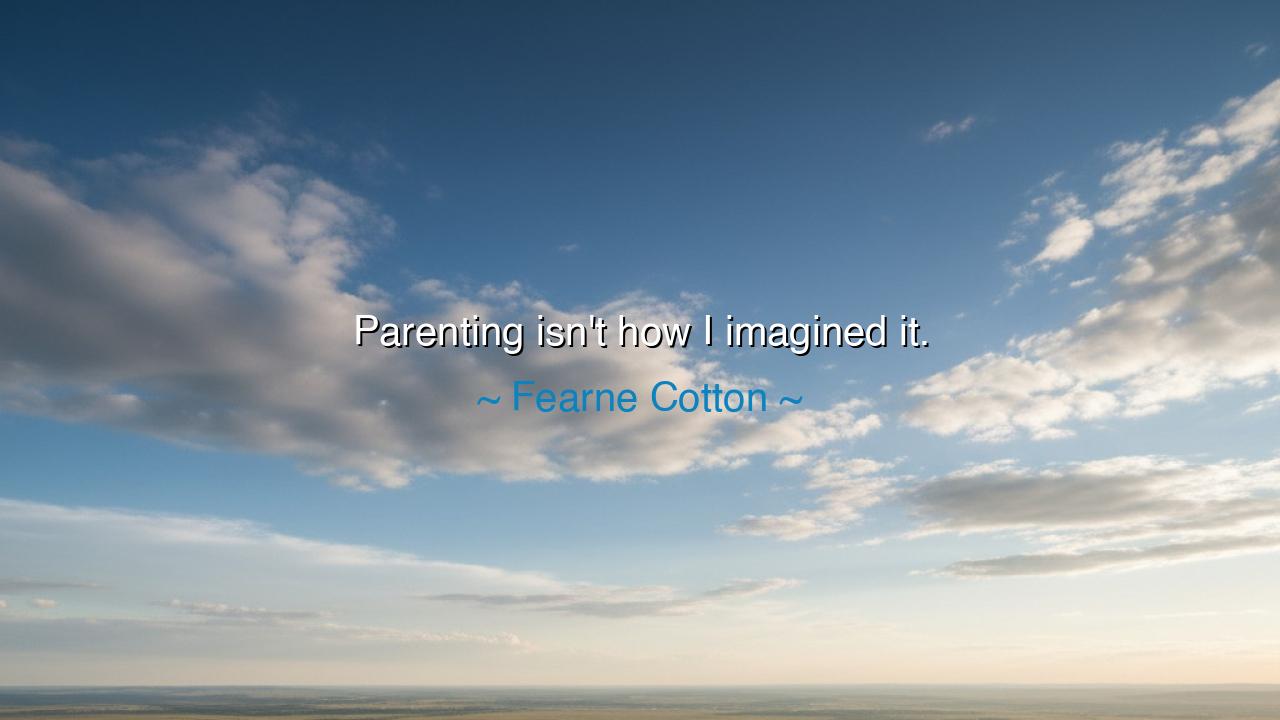
Parenting isn't how I imagined it.






Hearken, O children of generations yet unborn, and attend to the voice of Fearne Cotton, whose words capture the humble and profound truths of life: “Parenting isn't how I imagined it.” In these simple syllables lies a recognition as ancient as the raising of children itself—that the path of nurture is unpredictable, demanding, and filled with surprises both joyous and vexing. It is a reminder that the soul of a parent must be flexible, resilient, and willing to learn, for the child does not bend to expectation, but grows according to their own spirit and rhythm.
The origin of this reflection lies in Cotton’s life as a mother, observing the daily trials and triumphs of raising children in a modern world. She, like countless before her, imagined that parenting would be guided by ideals, dreams, and plans. Yet the reality, ever shifting and dynamic, revealed challenges that were unforeseen: sleepless nights, unexpected fears, moments of delight, and times of despair. Her words echo the timeless truth that the raising of young souls is a journey without a map, where intuition, patience, and presence guide the way more than any preconceived notion.
The meaning of her words is both profound and practical. To confess that parenting is not as imagined is to embrace humility and honesty, recognizing that control is limited, and perfection is unattainable. Children reveal their own needs, temperaments, and desires, which may defy expectation or imagination. In this, Cotton teaches that the true task of the parent is not to impose a vision, but to respond with love, attentiveness, and adaptability, to meet the child where they are and nurture who they are becoming.
Consider the example of Queen Victoria, who raised nine children amidst the duties of empire. Despite her careful plans and lofty ideals, she faced rebellion, illness, and heartbreak within her household. Her experience illustrates that expectation often yields to reality, yet the love and effort poured into guidance, even amid imperfection, bore fruits that endured. The children learned, grew, and carried forward the lessons of duty, resilience, and moral grounding, much as Cotton’s reflections suggest that presence and intention matter more than any imagined scenario.
Cotton’s words also carry a subtle reminder of grace: the ability to accept that life may diverge from expectation is itself a virtue of parenthood. To adapt, to adjust, and to respond without bitterness or regret is to cultivate both the child and oneself. The unforeseen moments—the chaos, the laughter, the tears—are not failures, but the very essence of human growth, teaching lessons that no plan could foresee. In this lies a liberation, a release from the burden of perfection and the illusion of omniscience.
The lesson for future generations is clear and luminous: embrace the unexpected, cherish the unfolding journey, and recognize that flexibility, patience, and love are the true instruments of nurturing. Do not despair when reality diverges from imagination, for it is in the moments unplanned and unanticipated that both parent and child are shaped, tempered, and strengthened. Wisdom in parenting is born not of mastery, but of presence and courage.
In practical life, one may follow Cotton’s counsel by remaining attentive, responsive, and humble. Listen to the child, observe their needs, and adapt expectations as circumstances unfold. Celebrate small victories, learn from mistakes, and cultivate a household of patience, understanding, and warmth. Recognize that parenting is a living art, not a fixed science, and that the journey itself is as sacred as the destination.
Thus, O children of future ages, carry this teaching as both lamp and compass: parenting will defy imagination, yet it shapes life profoundly. Embrace the surprises, meet each challenge with grace, and pour your presence into the nurturing of young souls. In doing so, you honor both the child and the eternal journey of growth, and your legacy shall be measured not by perfection, but by the love, resilience, and wisdom you impart to the generations that follow.






AAdministratorAdministrator
Welcome, honored guests. Please leave a comment, we will respond soon